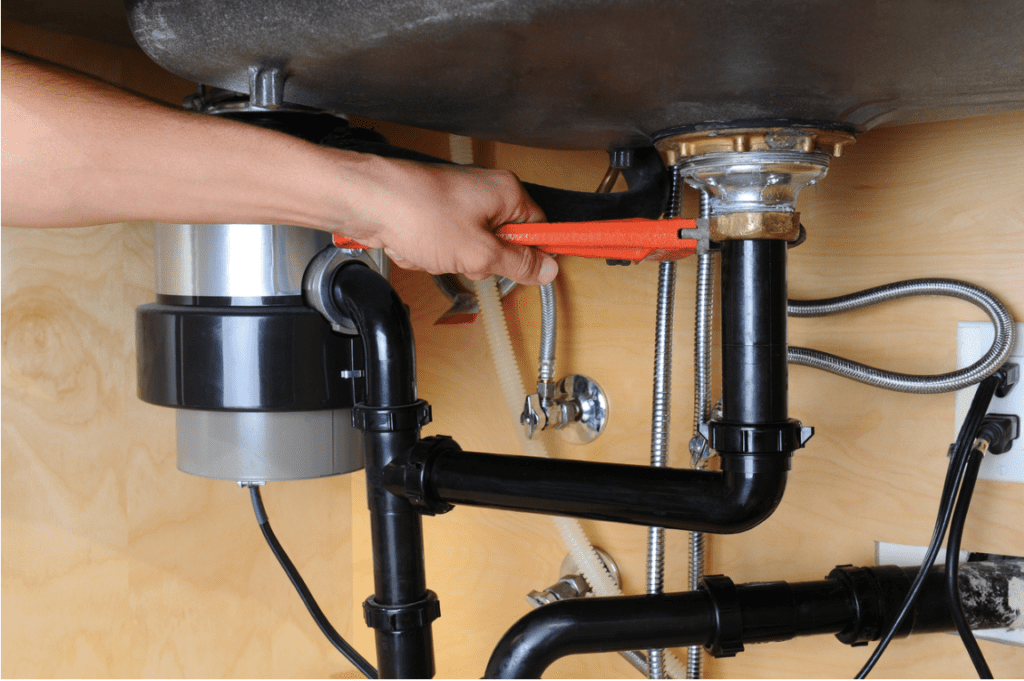While it may seem overwhelming, there are a few tips about the garbage disposal dos and don’ts. Maintaining your garbage disposal is just as important as understanding how it works and what types of foods should not go into it. Read on to find out more about the garbage disposal dos and don’ts.

How a Garbage Disposal Works
A garbage disposal mechanism sits underneath the sink in a kitchen and is responsible for collecting food waste in a grinding chamber. When the disposal gets turned on, a spinning disc turns very quickly, pulverizing the food into small pieces that get washed through holes in the disposal chamber. It is a common misconception that garbage disposals have sharp blades. These impellers are blunt, not sharp, and are used to break down the food waste.
Types of Garbage Disposals
Several different types of garbage disposals may be in your kitchen. Understanding the kind that you have can aid in troubleshooting any issues that may be wrong with it and speaking with a professional in the future.
Batch Feed
A batch feed garbage disposal grinds and disposes of food in small batches, hence its name. A small stopper is placed over the disposal, making the batch feed a safer type of disposal. They can keep children from putting their hands into the disposal or preventing wrong items from falling in. However, batch feeds are more expensive than other models.
Continuous Feed
A continuous feed garbage disposal continually grinds large amounts of food waste, allowing food to be continuously put into it as the unit runs. Specific models have features that prevent jams, such as auto-reverse, advanced grinding, and special circuitry. This model is easier to use and cheaper than batch feeds.
Garbage Disposal Dos and Don’ts
When maintaining your garbage disposal, knowing the dos and don’ts of using one is crucial.
What to Do
What to Put Down a Garbage Disposal
While you should avoid many substances when using garbage disposals, many types are perfectly safe. When running your garbage disposal, it is best to use cold water instead of hot water. Cold water keeps any residual fats and grease in solid form, which can help them run down drain pipes. Most foods are okay to go down the garbage disposal. However, some should be avoided.
How to Clean a Garbage Disposal
Keeping a garbage disposal clean is very important. A dirty garbage disposal can warrant the need for more frequent repairs and cause unpleasant odors. You can use a garbage disposal cleaner or degreaser to clean the disposal. Biodegradable cleaners are best as they scrub the grinding mechanism and chamber. If you don’t want to use a cleaner monthly, Ice cubes can also be used. Citrus rinds are a great way to neutralize any odors coming from a garbage disposal. If you have any leftover dish soap, this can do the same thing.
What Not to Do
Many types of food can cause harm to a garbage disposal and make it difficult to clean. For example, you should never put animal fats or grease down the disposal. The fat and grease of meat can quickly harden into a paste that a garbage disposal is not capable of eliminating. Cooking oils should also not be put into a garbage disposal. Over time, canola, vegetable, or olive oil can create a gel that will create clogs. Coffee grounds are another item that should be sparingly put into a garbage disposal. Small amounts are safe, but a significant amount can easily create a clog. Finally, large pits and large or thick bones should be avoided. These will usually bounce around in the disposal until taken out as the mechanism cannot grind them.
It is essential to unplug or disconnect a garbage disposal for safety before removing items from the chamber. While the teeth are not sharp, they can still cause injury if the disposal turns on.
When to Seek Professional Help
Sometimes, all a garbage disposal needs is a cleaning. However, there are instances where the help of a professional may be necessary.
Strange Noises
If the disposal is making strange noises, and you do not notice anything that could be making the noise, like a piece of silverware, you may need to call a professional. For example, the teeth may be misaligned, causing them to grind together. A professional will be able to make an easy adjustment if this is the case.
Frequent Resets
Garbage disposals have reset buttons to recover from certain situations like a clog. If you have to reset your garbage disposal very often, it may be time to replace it. Frequent resets could also mean loose wiring that a professional will need to address.
Odors or Clogs
Persistent odors and clogs signify that the garbage disposal may not be functioning correctly. If you have cleaned the disposal and checked for anything trapped in the chamber, there may be a more significant problem. If your disposal doesn’t need replacing, a professional will be able to figure out what needs fixing.
No Power
Suppose your garbage disposal is not turning on or off while in use; it may have a blown circuit, or it can have a failing motor. These issues may mean that your disposal needs replacing. Scheduling an inspection with a professional can tell you the next steps.
Having Garbage Disposal Issues? Call Goodbee Plumbing!
Goodbee Plumbing provides plumbing and drains services to homes throughout Louisiana. We offer a range of plumbing services, from drain cleaning to gas inspections. So if you aren’t sure about your garbage disposal, give us a call!
